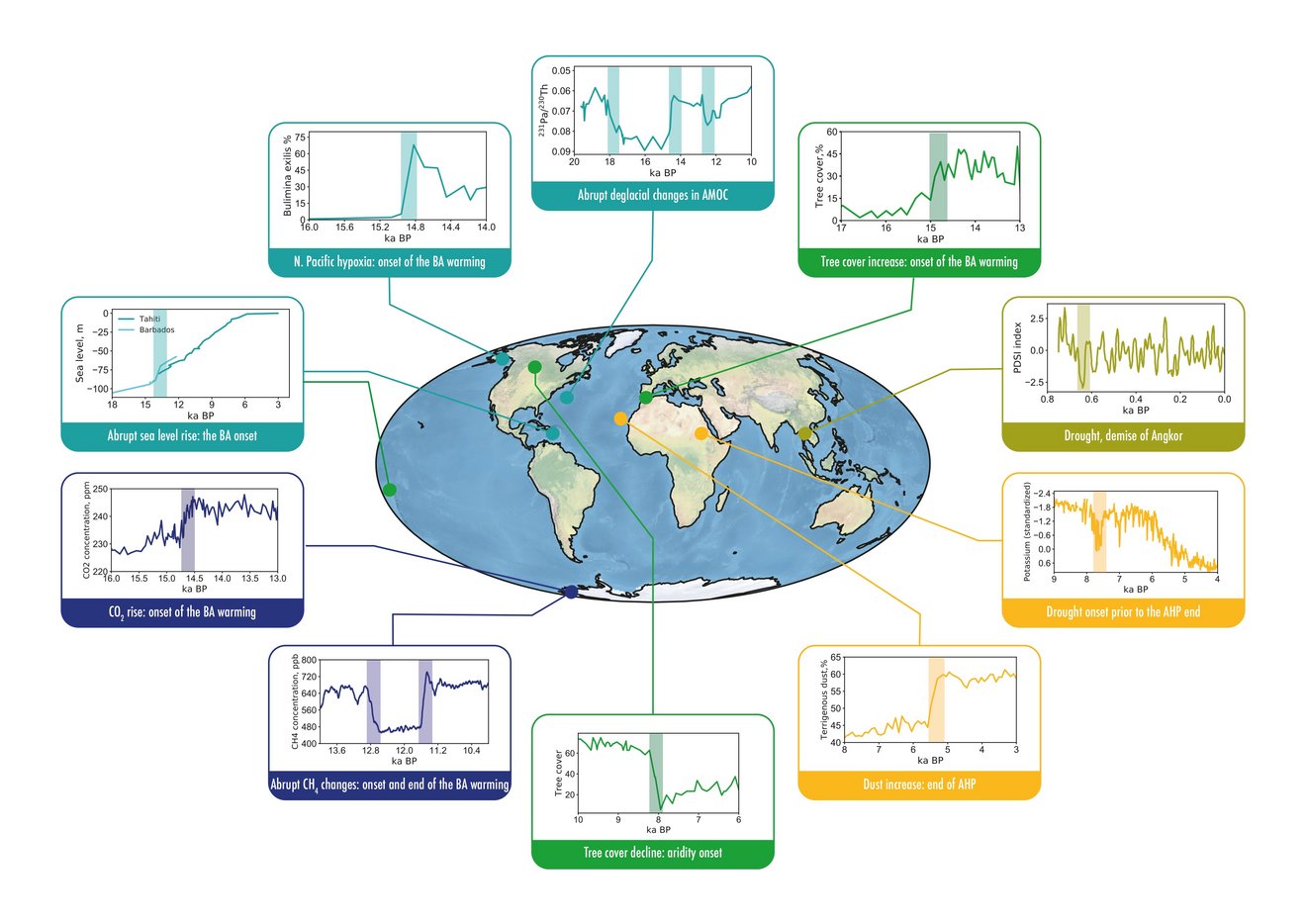Past abrupt changes provide evidence of cascading tipping points and ‘early warning signals’ in the Earth system
Prof. Victor Brovkin from the Max Planck Institute for Meteorology (MPI-M) and the leading author of the study, says “For humans, it is crucial to anticipate the future, we need to know what are surprises ahead. It sounds counterintuitive, but to foresee the future we may need to look into the past. A chance to detect abrupt changes and tipping points – when small changes lead to big impacts - increases with the length of observations. This is why analysis of abrupt changes and their cascades recorded in geological archives is of enormous importance.”
A possibility to decrypt an upcoming abrupt change in temporal or spatial patterns is a novel, powerful method called early warning signals. Dr. Sebastian Bathiany, an author from the Helmholtz-Zentrum Hereon, explains: “There are useful statistical indicators that can be interpreted as precursors of abrupt changes. Those include so-called slowing down before abrupt changes in oceanic circulation, or increased spatial variance of vegetation cover before the end of African humid period. At the same time, one needs to be cautious as some abrupt changes, such as the Black Sea flooding about 9.5 thousand years ago, cannot not be detected with such methods”.
For the study, it was important to decide on the conceptual framework for the analysis, including terminology. Prof. Martin Claussen, a co-author from MPI-M, comments: “How abrupt is abrupt? There are many definitions of abruptness, they are really context-dependent. Changes in most records evaluated in our study are about ten times faster than changes in the relevant forcing”.

Abrupt changes in the Earth system are not limited to one particular domain but can cascade through space and time. Dr. Jonathan Donges, a co-author from PIK, comments: “ice-ocean interactions, for example, during onset of the Bølling-Allerød warming in the middle of transition from the last ice age to the current Holocene warm period, lead to cascading impacts in deep ocean anoxia, vegetation cover, and atmospheric CO2 and CH4 concentrations. These changes could also interact with and amplify each other, and propagate among different spatial scales, to eventually affect human hunter-gatherer societies at that time”.
Prof. Michael Barton, Arizona State University, USA, notes, "We are increasingly concerned about the potential for abrupt changes resulting from human impacts in coming decades. Equally important, however, are societal dynamics that can make seemingly resilient human systems vulnerable to abrupt economic or political change - or even collapse - from otherwise manageable environmental fluctuations. Study of past socio-environmental tipping points can give us important insights needed to plan for future ones."
“Earth’s recent past shows us how abrupt changes in the Earth system triggered cascading impacts on ecosystems and human societies, as they struggled to adapt," said Professor Tim Lenton, Director of the Global Systems Institute at the University of Exeter, UK. "We face the risk of cascading tipping points again now – but this time it is of our own making, and the impacts will be global. Faced with that risk we could do with some early warning signals: What examples from the past show is that different climate, ecological, or social systems all become slower at recovering from perturbations before they reach a tipping point – where they fail to recover at all."
This paper is an outcome of the workshop “Abrupt changes, thresholds, and tipping points in Earth history and future implications” held in Hamburg, Germany in November 2018. The workshop was officially endorsed by the Analysis, Integration and Modeling of the Earth System (AIMES) and Past Global Changes (PAGES) projects of Future Earth.
Original publication:
Brovkin, V., Brook, E., Williams J.W., Bathiany, S., Lenton, T.M., Barton, M., DeConto, R.M., Donges, J.F., et al. (2021) Past abrupt changes, tipping points and cascading impacts in the Earth system, Nature Geoscience, doi: 10.1038/s41561-021-00790-5
Contact:
Prof. Victor Brovkin
Max Planck Institute for Meteorology & Center for Earth System Research and Sustainability, Universität Hamburg
Email: victor.brovkin@mpimet.mpg.de
Prof. Martin Claußen
Max Planck Institute for Meteorology
Email: martin.claussen@mpimet.mpg.de
Dr. Thomas Kleinen
Max Planck Institute for Meteorology
Email: thomas.kleinen@mpimet.mpg.de
Dr. Sebastian Bathiany
Climate Service Center Germany (GERICS), Helmholtz-Zentrum Hereon
Email: sebastian.bathiany@hereon.de
Dr. Jonathan Donges
Potsdam Institute for Climate Impact Research
Email: jonathan.donges@pik-potsdam.de
Prof. Michael Barton
Arizona State University, USA
Email: michael.barton@asu.edu
Prof. Tim Lenton
Global Systems Institute
University of Exeter, UK
Email: T.M.Lenton@exeter.ac.uk
